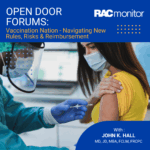
Ushering in a New Era of Digital and AI-Driven Healthcare
As healthcare continues to evolve in response to technological innovation and changing patient expectations, coding professionals are at the forefront of documenting that transformation. The

The lifting of regulatory limits on artificial intelligence (AI) in healthcare has the potential to revolutionize the industry, enabling faster diagnoses, more personalized treatments, and groundbreaking research. However, the decision also presents ethical, technical, and social challenges that require careful consideration.
AI has long been heralded as a transformative force in medicine. The removal of technology limits could accelerate innovation in several key areas:
Despite its potential, unrestricted AI in healthcare raises significant concerns:
The decision to lift AI limits in healthcare is a double-edged sword. On one side lies the potential to save lives, enhance efficiency, and democratize access to advanced medical care. On the other side are risks related to privacy, equity, and ethics.
To maximize the benefits while minimizing harm, policymakers, developers, and healthcare providers must collaborate on setting clear guidelines. This includes establishing robust data privacy laws, enforcing transparency in AI algorithms, and ensuring equitable access to AI-powered tools.
The future of healthcare with AI holds immense promise, but its success depends on responsible implementation. By addressing the challenges head-on, society can harness the full potential of AI while safeguarding the human aspects that make healthcare compassionate and ethical.
Programming note: Listen live today when senior healthcare consultant Timothy Powell reports this story live during Talk Ten Tuesday at 10 Eastern.
EDITOR’S NOTE:
The opinions expressed in this article are solely those of the author and do not necessarily represent the views or opinions of MedLearn Media. We provide a platform for diverse perspectives, but the content and opinions expressed herein are the author’s own. MedLearn Media does not endorse or guarantee the accuracy of the information presented. Readers are encouraged to critically evaluate the content and conduct their own research. Any actions taken based on this article are at the reader’s own discretion.


As healthcare continues to evolve in response to technological innovation and changing patient expectations, coding professionals are at the forefront of documenting that transformation. The

The educational content and schedule for the upcoming Open Door Forum Webcast series produced by RACmonitor and ICD10monitor have been unveiled. The announcement was made
Please log in to your account to comment on this article.

Stop revenue leakage and boost hospital performance by mastering risk adjustment and HCCs. This essential webcast with expert Cheryl Ericson, RN, MS, CCDS, CDIP, will reveal how inaccurate patient acuity documentation leads to lost reimbursements through penalties from poor quality scores. Learn the critical differences between HCCs and traditional CCs/MCCs, adapt your CDI workflows, and ensure accurate payments in Medicare Advantage and value-based care models. Perfect for HIM leaders, coders, and CDI professionals. Don’t miss this chance to protect your hospital’s revenue and reputation!

Struggling with ICD-10-CM coding for diabetes and complications? This expert-led webcast clarifies complex combination codes, documentation gaps, and sequencing rules to reduce denials and ensure compliance. Dr. Angela Comfort will provide actionable strategies to accurately link diabetes to complications, improve provider documentation, and optimize reimbursement—helping coders, CDI specialists, and HIM leaders minimize audit risks and strengthen revenue integrity. Don’t miss this chance to master diabetes coding with real-world case studies, key takeaways, and live Q&A!

Uncover critical guidance. HIM coding expert, Kay Piper, RHIA, CDIP, CCS, provides an interactive review on important information in each of the AHA’s 2025 ICD-10-CM/PCS Quarterly Coding Clinics in easy-to-access on-demand webcasts, available shortly after each official publication.

Uncover critical guidance. Kay Piper provides an interactive review on coding guidelines and more in the AHA’s fourth quarter 2025 ICD-10-CM/PCS Coding Clinic in an easy to access on-demand webcast.

Bring your questions and join the conversation during this open forum series, live every Wednesday at 10 a.m. EST from June 11–July 30. Hosted by Chuck Buck, these fast-paced 30-minute sessions connect you directly with top healthcare experts tackling today’s most urgent compliance and policy issues.

Fraud convictions don’t just punish a few bad claims; they can wipe out years of reimbursements. Don’t wait for an audit to learn the rules. Join Frank Cohen, MPA, for a live Q&A on spotting red flags, avoiding liability, and protecting your practice. Register now and bring your questions!

Substance abuse is everywhere. It’s a complicated diagnosis with wide-ranging implications well beyond acute care. The face of addiction continues to change so it’s important to remember not just the addict but the spectrum of extended victims and the other social determinants and legal ramifications. Join John K. Hall, MD, JD, MBA, FCLM, FRCPC, for a critical Q&A on navigating substance abuse in 2025. Register today and be a part of the conversation!

Vaccine policies, billing rules, and compliance risks are changing fast! How will your organization adapt? Join John K. Hall, MD, JD, MBA, FCLM, FRCPC, for a critical Q&A on navigating new Medicare mandates, coding updates, and legal challenges in vaccination programs. Get expert answers on billing, compliance, outbreak risks, and operational strategies to protect your facility and patients. . Join us live and bring your questions to the table.
Notifications